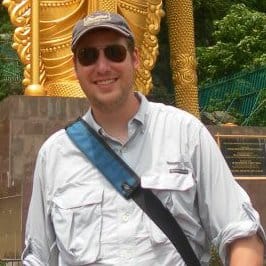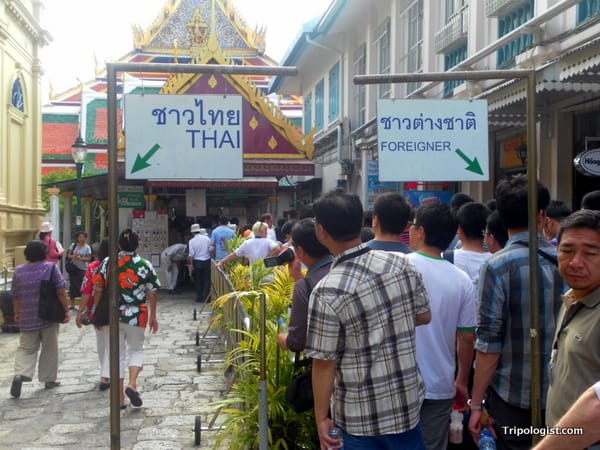I’m not going to lie, one of my biggest pet peeves when traveling is places that charge foreigners more than locals. It drives me absolutely crazy.
Some sites are quite subtle about it, putting the lower pricing in the local script while putting the tourist price in English. Other times, they’re very blatant about the different pricing for locals and foreigners and write both prices in English.
To me, there’s something really wrong about this practice no matter how you do it. When sites do this, it makes me feel that they only care about my money and not that I’ve come to see their attraction and learn about their country’s history and culture.
It’s really almost a slap in the face.
The one instance that really stands out to me was in Bangkok. At the Grand Palace, the ticket pricing for foreign visitors is 500 Baht (about $16 USD). On the other hand, locals get in for free. To make matters worse, foreigners had to go to a specially designated line and wait to enter while Thai’s walked in without issue.
However, it’s not just Thailand where this happens. In fact, at many of the most popular sites in Asia this is a common practice. At places as diverse as Angkor Wat in Cambodia, river tours in Malacca, Malaysia, and the Terracotta Warriors in Xian, China, I’ve been charged a good deal more than locals to enjoy the same experience. To me, this just isn’t right.
When it comes to restaurants, hawkers, or even taxi drivers, I can understand why they try to overcharge foreigners. However, I feel that a government owned or supported tourist attraction shouldn’t be promoting this practice. Not only is it unfair, but it also encourages local business owners to see tourists as walking banks.
What are your thoughts? Is it okay to charge foreigners more, or is it a bad practice that hurts tourism? Let me know in the comments section below.

Jim Cheney is the creator of Tripologist.com. Having traveled extensively in North America, Europe, and Asia, Jim enjoys sharing his love of travel and some of his favorite places to visit around the world. He lives in Pennsylvania, USA, with his wife and two kids.


![Shenzhen, China: A Brief Introduction [Guest Post]](https://tripologist.com/wp-content/uploads/2013/05/Shenzhen-Dongmen-Street-Food.Jonathan-DeLise-250x200.jpg)


Frankly, I don’t have a huge problem with it. The foreign dollar is a lot stronger than the currencies in Asia, so we end up paying proportionately.
I don’t understand what you mean about foreign dollars being stronger than local ones. After all, everyone is usually paying in the same currency. Could you explain further?
It’s definitely annoying, and not limited to tourist locations. I recently tried booking a flight from Shanghai to Xi’an via Air China. Called the airline for assistance booking – if I spoke Mandarin, the flight was $50. Otherwise, it was $120. But. . .the bottom line is that as a foreigner working in China (or as a tourist in SE Asia), I make more money than the average Chinese family; the prices are ultimately comparable.
As for the locals getting free admission, a lot of locals don’t earn the income necessary to see the tourist sites near their homes. My friend and I hired a taxi driver in Dunhuang to take us to various places around the city; his wife accompanied us because she had never been that far from the city. And, having finally gotten out that far, they had to wait outside the gates because they couldn’t afford the entrance fees.
This practice isn’t “fair” in the strictest sense, but I don’t have a problem with it. And maybe it’s an extra incentive to learn the local ways? At the night market in Dunhuang, we were smilingly told that if we could order in Chinese, it would cost less – and they were totally patient and helpful as we used our dictionaries.
I definitely understand what you’re saying about locals not making as much money. However, by charging foreigners more, aren’t they effectively treating us as a piggybank? They should just charge everyone the same lower fee, in my opinion.
I call it the foreigner tax. You see it posted at certain tourist sites or it is just more subtle. If you are shopping or catching a taxi the charges go up when they see the foreigner. I disagree with the fact well the western currency is stronger so it all balances out. If that’s the case I have been a lot of places where my home country currency was not as strong as theirs and did not get a discount because of it. It boils down to the mentality of
“You are a foreigner. You’re here traveling which means you’re rich since poor people don’t travel. So you can afford to pay more.”
There are places where tipping is not the norm at a restaurant and the locals don’t do it. But don’t tip as a foreigner and watch the dirty looks you get or remarks.
I definitely agree with you about the mentality of why travelers are charged more. You lost me a bit at the last part though. I’ve never had someone give me a dirty look when I didn’t tip in Asia. Thanks for the comment.
It’s frustrating indeed.
That said, there are many places in the US that offer free or reduced admission to locals either all the time or on specific days… these sites are usually supported by tax dollars and are required to provide access to tax payers.
At some sites you mention, it could be argued that reduced admission is a benefit of being a resident. Of course that doesn’t forgive the places that blatantly gouge the tourist or funnel them to a completely different visitor experience… which seems to be more prevalent.
I don’t have a huge problem with this and it is certainly not confined to SE Asia. Here in Australia you can get discounted tickets to theme parks if you can prove you are a local. Discounts are substantial too. I think I even saw a locals ticket price when we were at Disneyland. Without discounts local people often don’t visit.
Jim,
I think there are a couple things to consider here. I at first was very angry when we went to India and visited a UNESCO site. The local’s price was 20 Rupee and the Foreigner Price was 250 Rupee. Then I stopped and considered it and eventually rationalized it. While on principal everyone “should” be charged the same there are a few things to consider. First of all, when using the US Dollar vs. any Asian currency the dollar is significantly stronger, that 250 Rupee I was charged converts to about $4 USD. Secondly, the majority of tourist attractions and UNESCO sites are run by non-profits and are hurting for monies for restoration and maintenance, I’m happy to contribute to the sustaining of world heritage and historical sites, if I can afford more I should pay more (much like a tiered income taxation system). Thirdly, many tourist sites are subsidized by government tax dollars that come from property, sales, and income taxes. So the locals are paying for site maintenance out of their tax dollars while we are not. Also, a lower local price draws return visitors, your more likely to visit an attraction multiple times if you live nearby if it’s more affordable, that’s just good business sense. Finally, the “locals discount” is rampant all over the US it’s just presented in a different way. If I go to Disney World (or anywhere in Orlando for that matter) I get a Florida residents discount. When I lived in Miami there were several attractions that offered free or significantly discounted admission if I lived in a specific city or county. Once I put that all into context I realized that while ultimately it was annoying, it was reasonable for me to pay more at government run tourist sites.
Interestingly, what drives me insane is the hawkers and taxis that tried to grossly overcharge me because I was a foreigner. While the govt. run tourism sites are subsidized by tax dollars and the locals are already contributing via taxation a taxi service is not. I don’t see any rational reason why I should pay more for a taxi in any country because I’m not a local. The gas, distance, and route are all the same so the cost should be the same. There were times that a taxi driver has literally tried to charge me 10X the typical rate for a fare, simply because I am American. In india I actually negotiated with a taxi driver who started at 300 Rupee for a cab ride and eventually ended up taking me for the “locals rate” of 20 Rupee. To me that’s attempted robbery and wholly unacceptable.
I understand what you’re saying about tax dollars. That’s the only justification that I can come up with that makes any sense to me.
But on your second point, couldn’t you, and the taxi driver, use the same justification to charge more for the ride. After all, the US Dollar is strong and you probably have more money than the a typical local. If it’s okay for a UNESCO site to charge foreigners 12.5 times the local price, was is that not the same for a taxi driver?
That being said, I know it’s annoying. I never paid more than 10% of the starting price for any souvenirs in Beijing. Haggling is fine, but that’s a ridiculous mark up. Someone even tried to sell me a t-shirt for the equivalent of $80!
Jim, My problem with the taxi driver is the fact that his business isn’t subsidized by federal or local tax dollars (same goes for the souvenir shop). As a matter of fact in most countries I’ve visited (Including India) cab fares are regulated by the government and they are supposed to charge a set rate per kilometer. The trick in India is that all the meters are “broken” and no one polices it. So while the UNESCO site is charging more to preserve a piece of world history, the taxi driver is price gouging. There’s a big difference there to me.
True, but if the taxi driver sees the site charging foreigners more, don’t you think this passively encourages him to do so as well and makes it easier to justify the gouging?
If anything, I have less of a problem with the taxi driver charging more. After all, he has a family to feed.
So then, what about when Nepali or Egyptian tourists visit the Grand Palace in Bangkok? Their currencies aren’t strong, and their countries have tiered pricing too, but then again, if they can afford to leave their countries as tourists, do you side with them?
As a foreign student in Australia, I had to shell out more money for public transport because only Australian students qualified for the concession fares.
Later, as a traveller in Thailand, I also came across the higher foreigner prices.
As someone who has had to pay the higher prices time and time again, of course I’d prefer it if they only charged one price for both locals and non-locals. But if the result is that only those with resources have access, is this really fair to the locals? Locals obviously pay more in taxes and may also have historical/cultural claim to whatever it is us visitors are trying to access.
Yes it irks the living day lights out of me.
It makes me feel violated for having a stronger currency that I’m willing to spend on enjoying more experiences within the country. My biggest peev are taxi drivers who quote unrealistic prices until you walk away. I have not seen tourist prices in Vancouver so I can’t understand why we get nailed in Asia – as experienced
Glad someone finally agrees with me! Thanks for the comment.
I don’t think it’s ok, and I foresee a lot of haggling on my part because I too find this to be a slap in the face. My question is how can tourists get the fair price in situations like that where the price is blatantly different for us? Is there a safe and effective way?
You can obviously bargain with taxi drivers and in markets, but I don’t think there’s much you can do about listed prices at tourist attractions. You could always try to hand them exact change for the local price and see if they give you a ticket. Otherwise, I think you’re out of luck.
The comments basically cover all of my points and then some…but still, I do find it ridiculously annoying when it’s blatantly obvious.
This practice really irks me too. Prices should be the same for everyone. If a Thai national comes to the UK they are charged the same rate as us so why when we visit Thailand for example are foreigners charged more in some places. The same practice exists in the Philippines too.
The only way to overcome this is for foreigners to boycott the places that charge more, then the rates would soon come down, to compensate for loss of income.
As for having a stronger currency…. that is irrelevant….. as local wages, prices and currency go hand in hand, making some places are cheap and others more expensive.
Thanks for the comment. There definitely was a time or two I refused to go into smaller sites because of the practice, but it’s hard to convince yourself to skip the Grand Palace in Bangkok or the Temples of Angkor in Siem Reap, Cambodia because of the pricing.
Doesn’t mean it didn’t upset me to the pay the extra cost, though.
It is not OK whatsoever. You’re supposed to make
someone visiting you welcome. Charging more makes one feel like they are being screwed. Plus if you want to increase tourism…pissing people off
is not going help much. Not only do you have to worry about word of mouth but thanks to twitter, FB, and all the blogs out there…word gets around fast…
This may turn into a post of my own, Jim. I’ll simply say here that I’ve had very little difficulty getting the Thai price as I’ve traveled. This requires showing my debit card (something you cannot legally get as a tourist), and explaining that I’m a Thai resident. This doesn’t apply for tourists, of course, but for residents of Thailand showing some form of ID *should* get you the Thai rate.
As for the taxis, tuk-tuks, and other forms of transportation… I’ll let you wait for the post for that one…
That’s definitely a good tip. It was a shock to visit Southeast Asia after living in Korea for 2 years. In Korea, they like to give foreigners special deals, in Southeast Asia, they often try to get as much money from foreigners as possible.
This is our #1 PET PEEVE when traveling and I’m glad that i’ve finally found a few like-minded souls here 😉
Although many developing countries tend to have a 2-tier system of pricing for admissions to their local attractions, the disparity isn’t usually too significant (except for the Taj Mahal) and while not happy to pay it, i can understand that the locals should have easier access to their own landmarks and sites and accept this and pay. But as you’ve said, when it’s grossly disproportionate you just feel like dollar sign to them. Sri Lanka is also one of the worst offenders that’ we’ve encountered. In Kandy, at the Temple of the Sacred Tooth Relic (where there is one view a tooth of Buddha’s), they charged locals $1US (100Rs) and foreigners $15USD (1500Rs). I was told that in Singiriya, the entrance was 100 RS for locals and 3000 RS ($30 US) for foreigners!
We too sadly must walk away from these sites as we aren’t the ‘rich tourists’ that they take us for. I’ve walked away from the Taj too for this reason as at the time, I just couldn’t justify it in my budget.
But what’s even worse than over-charging for sites and attractions is when merchants in everyday shops blatantly try to over-charge you for basic staples such as bottled water. I’m not talking about the guy on the street in front of the tourist site or at a market–i’m talking about a proper shop. We encountered this quite a bit in Vietnam where they don’t put prices on things (unlike in Thailand) and you can feel the shop owner take that split second to size you up when you ask the price. In Laos we also experienced restaurant owners charging us more for a bowl of soup noodles versus the local guy sitting next to us who’s having the exact same thing. Can’t stand this sort of thing.
People have commented on my blog that it’s justified because they are poor countries. I disagree. Tourism itself already contributes to local economy. Over-charging on an individual basis is just plain dishonest.
Thanks for the comment, Jess. I definitely agree. In fact, the rampant overcharging and scamming is the reason I didn’t visit Vietnam last year. I’m sure I’m not the only tourist the practice has cost them.
We too avoided Vietnam for many years for the same reason. Although the rampant overcharging and scamming is a royal pain in the a**, not everyone is like that (only those who have contact with tourists LOL) you shouldn’t let it deter you from experiencing the country. Vietnam is an amazing and diverse country and we were really get glad we went. We just couldn’t stand to stay too long due to the attitudes.
Oh, and i should add–about 7yrs ago, the VN gov’t standardised all admission fees to national attractions so now everyone pays the same admission prices.
I get annoyed by it too, because sometimes the price is annoyingly high, especially if you’re visiting lots of places, but if the price were the same for both people, there would be plenty of locals who would be incapable of seeing their own monuments. I recently saw a picture of a group of 20 or 30 Peruvians who were taken for free to see Macchu Pichu for the very first time. Imagine being in your own country but not being able to see your own monuments…that would kinda suck.
Definitely some good points, but couldn’t the site just charge locals and tourists the same low price? That would solve both issues.
I’m Thai and frankly speaking, it’s free entrance for Thai citizen not lower charge as you understanding.
I have ever working in China, some place is free for local as well but it will be charged if you are foreigner. Not only in Asia, in Europe same as well. I have ever entrance to some Deutsch Musuem and frankly speaking most of them higher charge for foreigner and lower whether gratis for local. I suppose this is a pattern around the world.
One thing to consider, especially for a public attraction, is that the locals pay for that every day. It’s called taxes. In essence, they’re partial owners of the attraction.
And for some of those attractions it’s not a “sight” for them to see… it’s a part of their life that has always been free even before some foreigners decided to show up and take pictures of it for lonely planet.
True. As I said in several other comments, I can understand the argument about paying for taxes for sites owned by the government, but I don’t think that foreigners coming means that it’s okay to charge them for that privilege. If it’s free for locals, why shouldn’t it be free for foreigners?
I don’t have an issue at all especially in countries where the local wage is a lot lower than the wages earned by a traveller. I just see it as part of traveling and don’t stress about it.
We all have our pet peeves. Mine is people who write ‘sites’ when they mean ‘sights’ 😉
Depending on the context, you could conceivably use both. For example “The sight of the sites is impressive.”
I don’t like it, but I don’t hate it either. A thing worth knowing – if you stay in Thailand for longer you can apply for a Thai driving licence and then you get all the privileges as well.
Hi,
As someone who has lived and taught in Vietnam, Thailand, and China, I wanted to give my two bahts. I agree with others that at govt sites and the like, it can make more sense that locals pay less due to taxes and subsidizing. However, I also get my arse chapped that tuk tuk drivers, taxi drivers, shop owners, and others try to overcharge just since I’m a foreigner “farang”. I gave up on being an apologist years ago (“Aww they’re poor, it’s ok”) and feel that you shouldn’t be overcharged just since you’re an outsider. It’s not just a Thai thing, I was charged more than locals in most SE Asian countries I was in.
When I first moved to SE Asia I’d get angry and get an attitude with the locals (especially in Vietnam), but then I mellowed out and learned to say “Forget about it” and walk away. The only place I truly never want to see again in Thailand is Chumphon, since we were hustled and overcharged in restaurants, by the tuk tuk drivers, and even at the railroad station bathroom. The sign blatantly said 3 baht, but the lowlife tried to charge me 5, even after I pointed at the sign. Would my wee-wee had been any different from a local? I think not. But, on the plus side, once I started learning to speak and write Thai, I was better able to barter Thais down, with a smile on my face. Looking back at my time in Isaan, more often than not I was charged Thai prices for everyday things, so I truly believe that once you get outside the touristy cities and can speak basic Thai (or whatever language), you have a better chance of getting a better price. If you go to the touristy traps, it’s gonna be obvious you’re a tourist (stating the obvious). I can say that I experienced the dual-pricing system in Thailand, Laos, Cambodia, Vietnam, and Malaysia, so it goes on all over. As I tell myself, if you want to be charged the same price as the locals, then I’d imagine go to places like Japan, England, Germany, etc. (1st world countries).
Also, many of these people who overcharge foreigners/tourists are uneducated. The tuk tuk drivers, shop owners, taxi drivers, hawker, etc. probably never graduated high school and are in the common sense “losers” who never amounted to much in life and now are envious of foreigners.
Charging others more just because they’re not from your home country is a bit like racism. It’s discrimination and wrong.
We stopped traveling in Asia this year after we have been a Malaysia. Were sick of being charged more than double everywhere. The Malaysian government even passed a new law in September 2017 to charge foreign tourist extra RM10 per night when they book in the hotel.When we see there are lots of fancy cars parking at the places we wanted to visit, but got shy away by the huge price differences. It just made us angry. So this rubbish that the locals cant afford it, it’s clearly not true! So yet, bye bye Thailand and Malaysia! We will spend our tourist money in Australia.